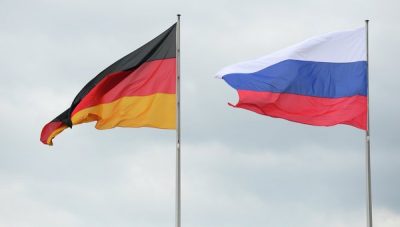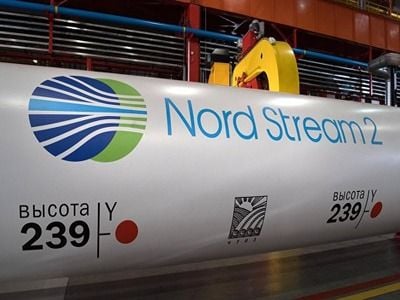Frozen Deutschland. Suspending Nord Stream 2? “A Perfect Storm of Russian Aggression”

All Global Research articles can be read in 51 languages by activating the “Translate Website” drop down menu on the top banner of our home page (Desktop version).
To receive Global Research’s Daily Newsletter (selected articles), click here.
Visit and follow us on Instagram at @crg_globalresearch.
***
A “perfect storm of Russian aggression during the coming winter months” is all but inevitable. Watch it on your screens while you properly freeze.
As much as with “brain dead” NATO (copyright Emmanuel Macron) no one ever lost precious assets betting on the incompetence, narrow-mindedness and cowardice of political “leaders” across the Atlanticist EU.
There are two main reasons for the latest German legalese gambit of suspending the certification of the Nord Stream 2 pipeline.
- Retaliation, directly against Belarus and Russia, “guilty” of the disgraceful refugee drama at the Poland-Belarus border.
- Politicking by the German Greens.
A high-ranking European energy executive told me,
“this a game where Germany does not hold a winning hand. Gazprom is very professional. But imagine if Gazprom decided to deliberately slow down their deliveries of natural gas. It could go up tenfold, collapsing the entire EU. Russia has China. But Germany does not have a workable contingency plan.”
This ties up with a proposal that is sitting at a crucial desk in Moscow for approval for two years now, as I reported at the time: an offer by a reputable Western energy firm of $700 billion for Russia to divert their oil and gas exports to China and other Asian customers, away from the EU.
This proposal was actually the key reason for Berlin to resolutely counteract the U.S. drive to stop Nord Stream 2. Yet the torture never stops. Russia now faces an additional hurdle: a carbon tax on exports to the EU which include steel, cement and electricity. That may well be extended to oil and natural gas.
Every sentient being across the EU knows that Nord Stream 2 is the easiest path to lower natural gas prices across Europe, and not the EU’s blind neoliberal bet of buying short term in the spot market.
“They are going to freeze”
Seems like the Bundesnetzagentur, the German energy regulator, woke up from a deep slumber just to find out that the Swiss-based company Nord Stream 2 AG did not meet the conditions to be an “independent transmissions operator” and could be certified only if it was “organized in a legal form under German law.”
The fact that neither the Germans nor the Swiss company were aware of it during the long, previous, always turbulent stages is very hard to believe. So now it looks like Nord Stream 2 AG will have to establish a subsidiary under German law only for the German section of the gas pipeline.
As it stands, the company is not “in a position” to comment on details and especially “the timing of the start of the pipeline operations.”
Nord Stream 2 AG will have to transfer capital and personnel to this new subsidiary, which will then have to present a full set of documentation for certification all over again.
Translation: gas from Nord Stream 2 will be absent during the coming winter in Europe and the pipeline, at best, might start running only by mid-2022.
And that certainly ties in with the politicking angle, as the German regulators are de facto waiting for the new German ruling coalition to emerge, including the neoliberal Greens who are viscerally anti-Nord Stream and anti-Russia.
The European energy executive did not mince his words on a quite possible scenario:
“If Germany does not obtain their oil and natural gas by land now they cannot fashion a fall back position, as there is not sufficient LNG capacity or oil for that matter to supply the EU this winter. They are going to freeze. Much of their economy will be forced to shut down. Unemployment will soar. It would take four years to build up LNG capacity for natural gas but who will build it for them?”
Germany has zero margin of maneuver to dictate conditions to Gazprom and Russia. The gas that Gazprom won’t sell to northern Europe will be sold to eastern and southern Europe via Turk Stream, and most of all to Asian clients, which do not engage in blackmail and pay much better than the Europeans.
What is also clear is that if by a misguided political decision Nord Stream 2 gas is eventually blocked, the fines to be collected by Gazprom from the European consortium that begged for the construction of the pipeline may exceed 200 billion euros. The consortium is made up of Engie, Shell, Uniper, Wintershall Dea and OMV.
It’s against this background that the offer on the table in Moscow becomes even more than a game-changer. The bold recommendation to the Kremlin – with financing already in place – is that Russia’s natural resources including oil and natural gas should be redirected to China, as part of the Russia-China strategic partnership.
The proposal argues that Russia needs no trade with the EU, as China is way ahead of them in most advanced technologies. That certainly provides Moscow with the upper hand in any negotiations with any German government. As I mentioned it to the European energy executive, his terse comment was, “I doubt they will desire to commit suicide.”
It’s all Putin’s fault
It would be too much to expect from German and EU politicians the clear-sightedness of the government of Serbia, which is considering importing 3 billion cubic meters of Russian natural gas annually for 10 years. Gazprom has been on the record for years demonstrating the practical, reliable and cost-conscious aspects of long-term contracts.
Russian Foreign Minister Sergey Lavrov, commenting on the migrant crisis at the Poland-Belarus border, noted how “Poland behaves outrageously, while the leadership in Brussels applies double standards that are so apparent and naked that they can’t fail to understand that they are embarrassing themselves.”
The case of Nord Stream 2 adds extra layers to EU self- embarrassment as it concerns the wellbeing of populations already living inside Fortress Europe. Let them freeze, indeed – or pay virtual fortunes for natural gas that should be readily available.
As we all know, Germany, Nord Stream 2, Ukraine, Belarus, it’s all interlinked. And according to a Ukrainian lunatic profiting from an Atlanticist platform, it’s all Putin’s fault – guilty of conducting hybrid war against the EU.
It will be up to the “resolve of Poland and Lithuania” to “counter the Kremlin threat”. The ideal framework in this case should be the Lublin Triangle – which unites Poland and Lithuania with Ukraine. These are the lineaments of the new Iron Curtain, erected by the Atlanticists, from the Baltic to the Black Sea, to “isolate” Russia. Predictably, German Atlanticists are a crucial part of the package.
Of course, to be successful, these actors should “also seek greater U.S. and UK engagement”, with every movement complementing “the role of NATO as the ultimate guarantor of peace in the region”.
So behold, EU mortals: a “perfect storm of Russian aggression during the coming winter months” is all but inevitable. Watch it on your screens while you properly freeze.
*
Note to readers: Please click the share buttons above or below. Follow us on Instagram, @crg_globalresearch. Forward this article to your email lists. Crosspost on your blog site, internet forums. etc.
Pepe Escobar, born in Brazil, is a correspondent and editor-at-large at Asia Times and columnist for Consortium News and Strategic Culture in Moscow. Since the mid-1980s he’s lived and worked as a foreign correspondent in London, Paris, Milan, Los Angeles, Singapore, Bangkok. He has extensively covered Pakistan, Afghanistan and Central Asia to China, Iran, Iraq and the wider Middle East. Pepe is the author of Globalistan – How the Globalized World is Dissolving into Liquid War; Red Zone Blues: A Snapshot of Baghdad during the Surge. He was contributing editor to The Empire and The Crescent and Tutto in Vendita in Italy. His last two books are Empire of Chaos and 2030. Pepe is also associated with the Paris-based European Academy of Geopolitics. When not on the road he lives between Paris and Bangkok.
He is a frequent contributor to Global Research.



